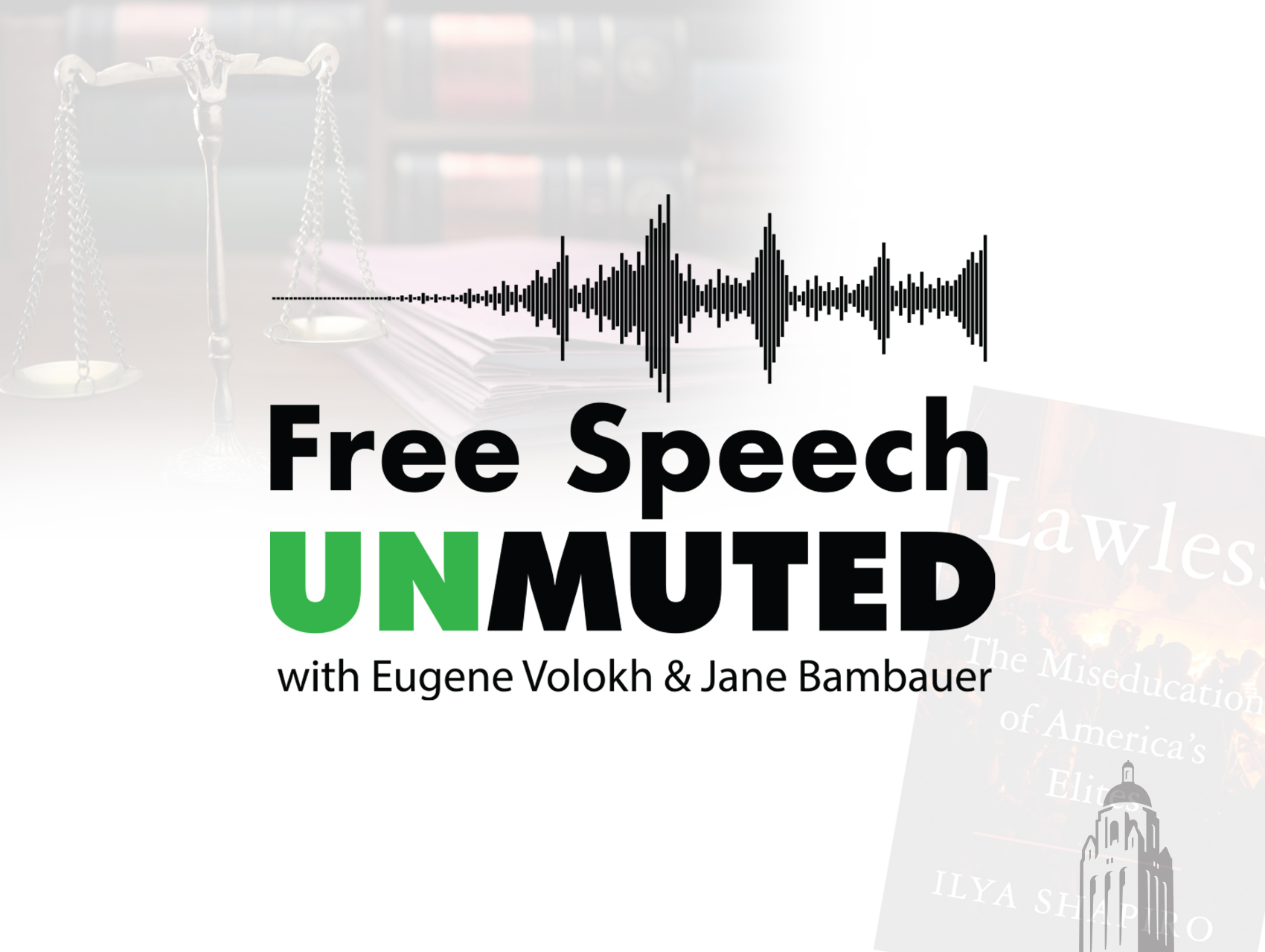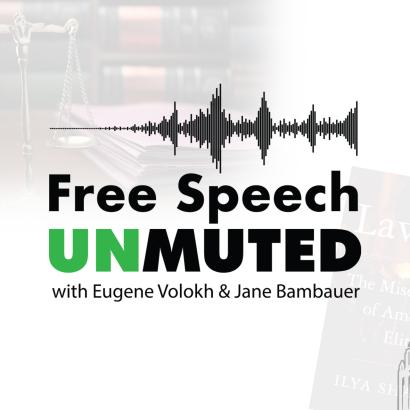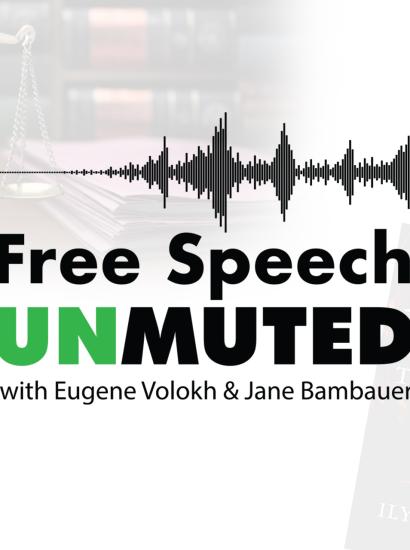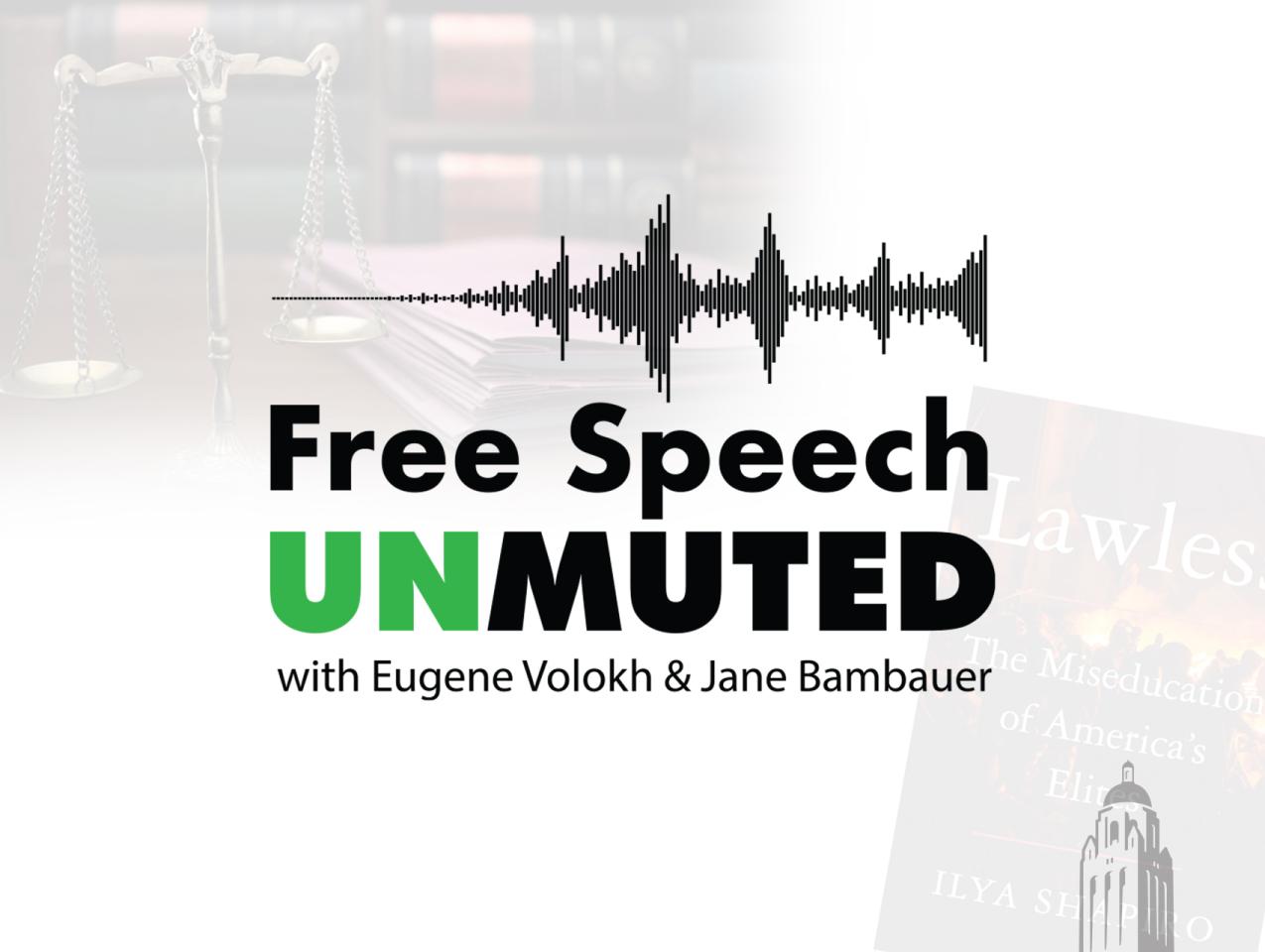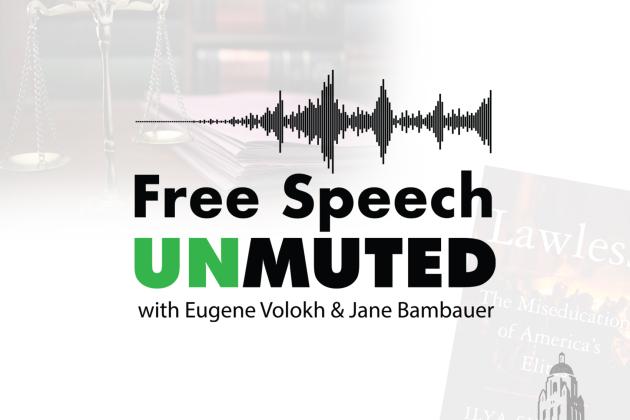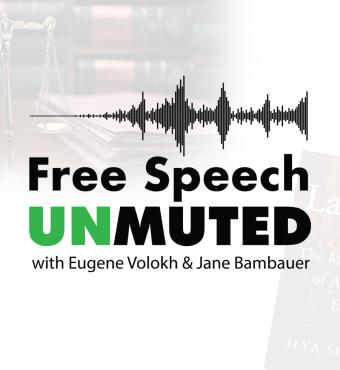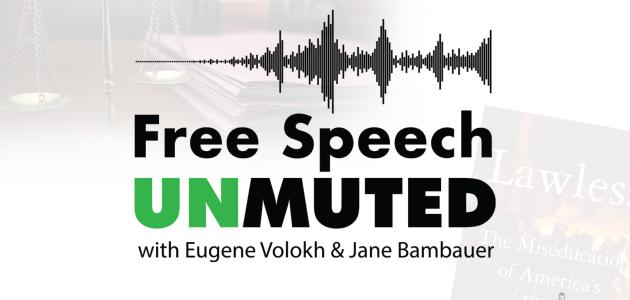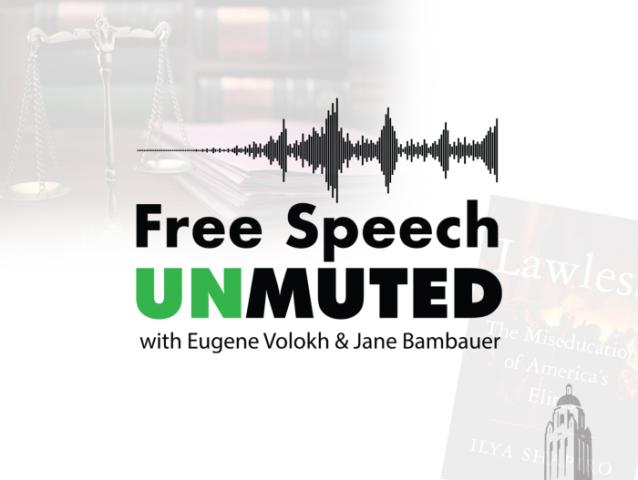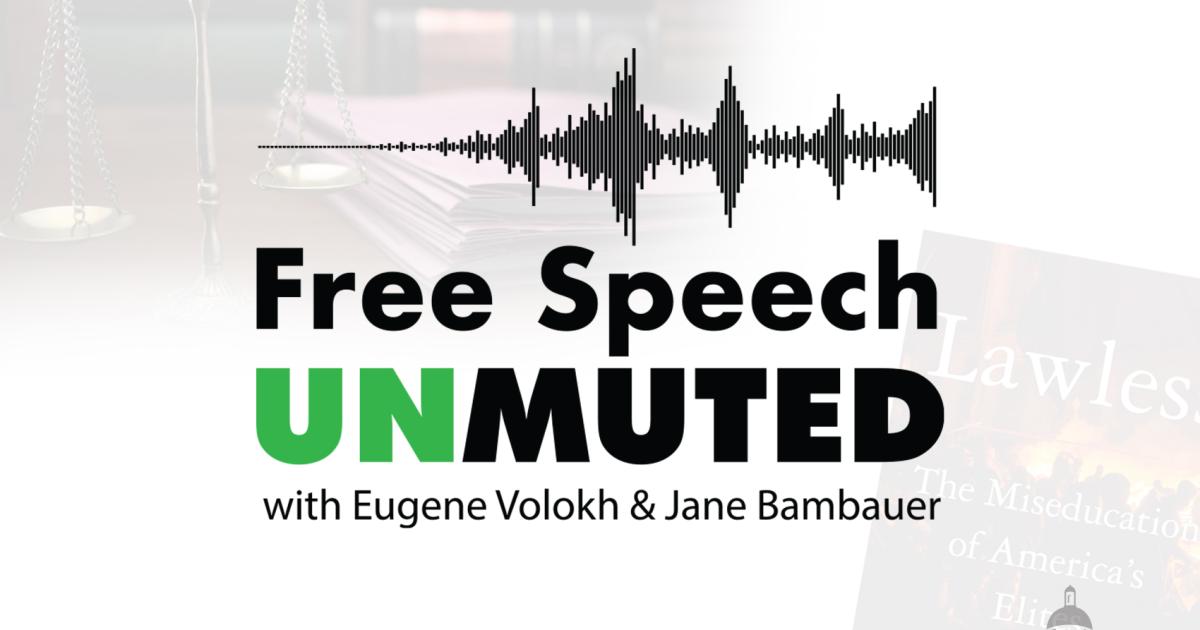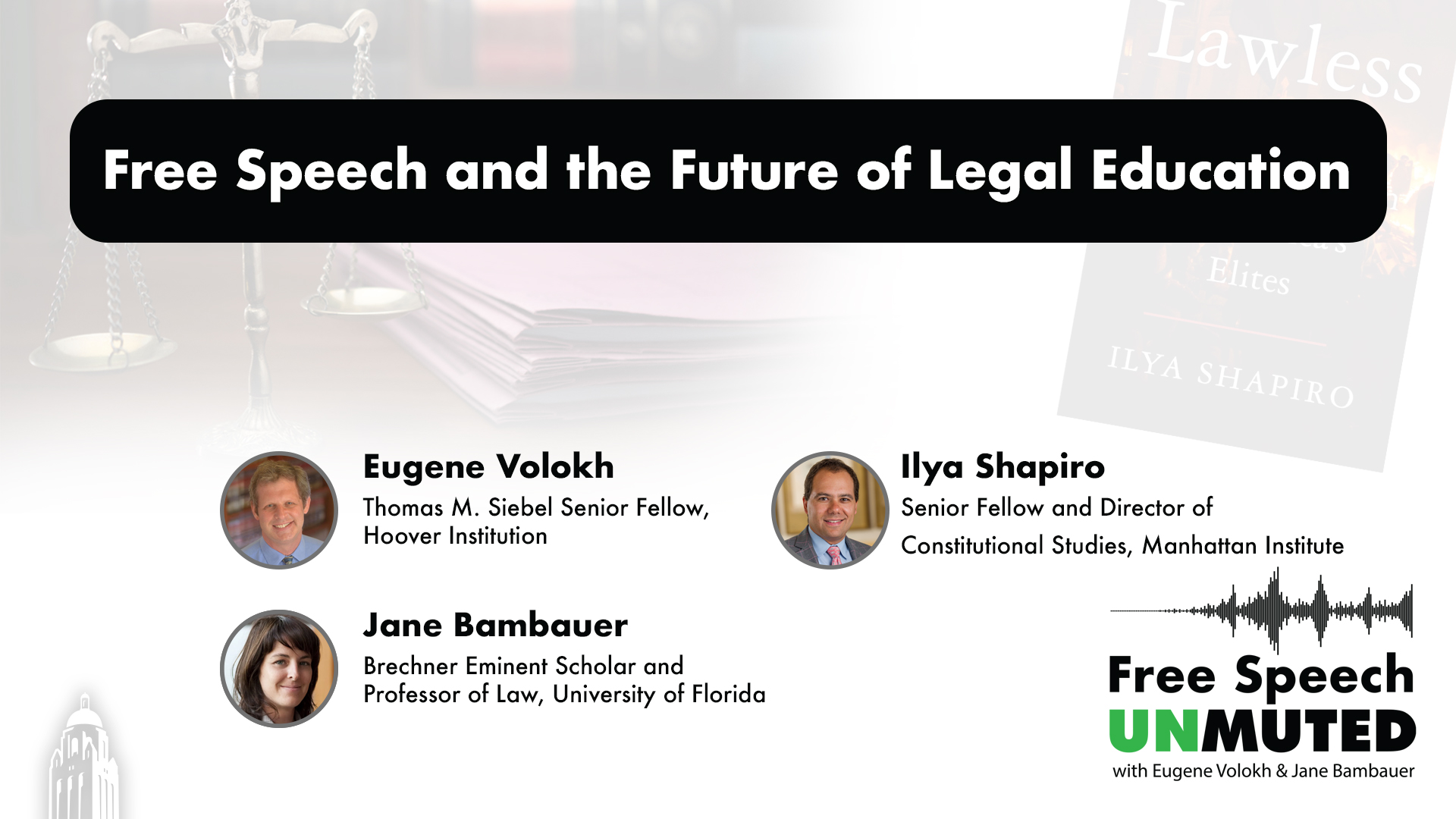- Law & Policy
- Politics, Institutions, and Public Opinion
- Higher Education
- Political Philosophy
- Revitalizing American Institutions
Ilya Shapiro, Senior Fellow and the Director of Constitutional Studies at the Manhattan Institute, joins Free Speech Unmuted to discuss his new book Lawless: The Miseducation of America’s Elites. Ilya, Jane, and Eugene discuss the state of American law schools, why many students fear open discussion, and what can be done to improve things.
- Hello and welcome to Free Speech Unmuted. We have today, of course, our co-hosts Jane Bambauer from the University of Florida Law School and Communications Department. I'm Eugene Volokh from the Hoover Institution, and also Professor of Laura Emeritus at UCLA Law School. But we're also delighted to have today our special guest, Ilya Shapiro from the Manhattan Institute. And he's gonna be talking mostly about, although who knows, who knows where the conversation will go about his book that came out this year, lawless, the Miseducation of America's Elites. And I, I, I like the, the opening, opening sentences of the publisher's blurb on Amazon. In the past, Columbia Law School produced leaders like Frank Franklin Delano Roosevelt and Ruth Bader Ginsburg. Now it produces window smashing activists. Well, you know, maybe even in the past it produced a mix, and maybe even today a mix. But it is a nice and stark contrast. And there's a sense that there's something not quite right about American legal education. And of course there are others who say, well, you know, it's, it's actually, it actually is. Right. Maybe not the Windows Smashing activist part, but other, but other kinds of activists. So, Ilya, we'd love to hear some about your book. Maybe you can just give us a brief introduction
- Yeah.
- Thesis and a few, few particular examples. And then maybe Jane and I can, can ask some follow up questions, whether probing your analysis or agreeing with it.
- Sure. And thanks Eugene and Jane, for having me. It was odd to hear of you refer to yourself as emeritus. 'cause I still think of you as a fair-haired boy, the, the derkin of the First Amendment and, and all of that. But I guess you, you serve long enough, you know, when you become a tenured professor at 15 or whatever it was, you were, you, you get to retire when you're still young. Yeah. So this book arose, and it's an indictment of the, the illiberal takeover of legal education as a subset of higher education. Of course, these ills are not limited to law schools, but write what you know, and also only bite off as much as you can chew. And there's lots being written about higher ed. And I thought, well, law schools are particularly the, you know, the, the, the takeover, the perversion of law schools is particularly dangerous because as bad as it is, if a sociology or English department goes off the rail, you know, the, the consequences for society aren't quite as dire as if the future gatekeepers of our legal and political institutions all of a sudden believe that all of the law is illegitimate. Our institutions need to be burnt down and reconstructed according to a privilege hierarchy or intersectional matrix or, or whatever else. And, and that's the real problem here. And I get at this, that this book arose from, to, to borrow some language from that postmodern left a lived experience that I had when I was hired to run Georgetown Center for the Constitution, which is an important center because as we've learned, the rest of the law school is a center against the Constitution. So this was over three years ago now, ancient history, we were saying in the, in the green room before the, before this, this recording, when I had been at Cato for almost 15 years. That's how you and I got to know each other, working together in various ways. And I got the opportunity. Randy Barnett, no stranger to listeners of this podcast, no doubt, hired me to run the center that he founded at Georgetown. And a few days before I was due to start that new job was when Justice Breyer announced his retirement. And the subject of my last book, Supreme Disorder, was Supreme Court politics. So this is my bread and butter, and I was commenting on this, offered up a hot take on Twitter late at night. Not a best practice. Wasn't worded very well, but my, you know, I centered off, went to bed and my ideological enemies went after me, went after my career. My job, I experienced four days of hell, followed by four months of purgatory as I related where the Dean of Georgetown's Law School, bill Trainor first decided neither to fire me, nor to vindicate my free speech rights while disagreeing with me, what have you, punted it to the DEI office, which investigated me for four months as to whether my tweet was harassing or discriminatory in some way at the end of which I was reinstated because a junior associate at the big fancy law firm, they hired to advise them, looked at a calendar and, and found that I wasn't employed when I tweeted. So all these policies don't apply to me in the first place, a jurisdictional defect as it were. So where we went, I got the fine print from the, from the DEI office after I was technically reinstated. And that made clear that if I ever, I said something that offended someone, regardless of Georgetown's very good free speech policy on paper or pixels, that if I offended somebody, I'd create a hostile educational environment and my I'd be back before the Inquisition. And I couldn't work that way. I couldn't do the job that I was hired to do. And so I quit and I, I published my resignation letter in the Wall Street Journal, as one does, and then announced my move to the Manhattan Institute on Fox News, as one does and have been using this moment that I've been given. I wasn't, you know, hoping to turn my career into focusing on higher education policy and, you know, what's gone wrong, how can we fix it? But that's the direction that, that it's gone. And that's how the book turned out. And the, the basic thesis, and I wanna be clear on, is that something's going on, as you said at the outset, that's different than kind of the decades old conservative lament about left-wing faculty bias or the hippies taking over the faculty lounge, you know, those hippies, the, the, the Berkeley free Speech movement in the sixties would now be by today's radicals considered retrograde white supremacists. And that illiberal culture is aided and embedded by weak university and, and law school leadership. And so there are failures of ideology. The, the crits are back critical theory, critical legal studies, failures of bureaucracy and explosion of non-teaching staff in the last decade, especially in the DEI area. But there's lots of faults for deans and sub deans and administrators to go around and a failure of leadership. So those are the, the three big, big failures that I document. And how do we fix it? I think it's gonna take what economists call exogenous shocks, meaning action by employers who, you know, don't wanna hire people who scream at federal judges that they hope their daughters are raped. As happened at Stanford a couple of years ago to Kyle Duncan that don't wanna hire supporters of, of Hamas and, and terrorism and things like that. It'll take action by state legislators who, for public systems at least, can de decide to defund offices that are counterproductive. Just the same as they decide, okay, this is gonna be our tech school, this is gonna be our liberal arts school, things like that. It's gonna take action by now we see the federal government because of course follow the money and there are strings attached to federal funds. And we can talk about that. The, the actions the Trump administration has taken. My book came out a week before the inauguration, so none of the, the latest developments are, are accounted for then. But certainly it, it's, it's noted at
- Oh, great. Well it sounds very interesting since you brought up the, the Georgetown incident. I do think for our listeners benefit, we need to get the specific details. You said it was an inartfully worded tweet. Can you tell us what it is, what it was?
- Sure, yeah. So this was, again, after Breyer announced his retirement. Joe Biden quickly said that he would maintain his campaign promise to appoint a black woman to the Supreme Court. Nothing wrong with that, of course, but I thought you shouldn't re replace your, limit, your candidate pool, whether you're hiring for a, a janitor, let alone a justice by race and sex. And so I said that, well, you know, if I was a Democratic president, I'd pick sen, the chief judge of the DC circuit, very well regarded progressive, happens to be an Indian American immigrant as well. So checks certain demographic boxes, but given what I call the, the current hierarchy of intersectionality, he's out and will be left with a lesser black woman. And it's those three words that really got me in hot water.
- Got it, got it. So I I was happy to, to, to speak out in that kind of situation. I do think that in in in, in support of your academic freedom rights there. I do think that, that in context, you were, you were simply describing kind of the, the identity politics in play there. But I do think it was important for people to know exactly what, what the statement was and why some people might have been offended by it. So tell us a little bit more about how you think the current situations with law schools is different from what one might think would be the right way for higher educational institutions to operate, which is that, you know, there are faculty who have different views. Some of them may be quite radical, some of them may be a lot more centrist, but they express their views and to, to the public, the public can accept them or not in the classroom. They may express their views as well, although we expect them to, to, to make sure that students, especially in a law school, learn both sides. But at least some, some of the radical faculty say, well, in the classroom we do actually teach both sides and we express our position because our students will wanna know that. So you're, you're going to have, you know, in a well, well-functioning university, you are going to have people expressing views, including ones that are for, for radical reform. Because one of the things that we seek the argument would go from universities is someplace that says, you know, lots of institutions are there to support the status quo. Some of us faculty are against the status quo, but here's why. What do you think is particularly bad about the current, current system that departs from that norm?
- I think in too many law schools, the students aren't exposed to the full panoply of views of interpretive methods. The, the law schools are really doing a disservice in not presenting at all or, or poorly perspectives or methodologies, say originalism, say, arguments that are more conservative or libertarian. And that does a disservice in terms of training lawyers, because of course, successful lawyers see the issues presented towards them, whether they're negotiating a business transaction or arguing for their clients, getting acquitted in court or, or what have you. Seeing all the, the, the perspectives around a, a given issue. And if, if half of those perspectives are, are simply not there or are unsafe or triggering or you can't discuss them, then that's, that lawyer isn't going to be as good. And, and given that the federal judiciary is always going to be roughly half appointed by Democrats and half appointed by Republicans, it, it's malpractice, legal, educational malpractice not to teach, you know, leading interpretive theories across the board. So that to give the students the tools to advocate in, you know, before judges who might not share their philosophical priors and, and and things like that. But in addition to that, and here's where the bureaucratic aspect comes in, it's not just, again, faculty bias or discrimination based on viewpoint or ideology and hiring kind of a self perpetuating vicious circle, if you will. But the, the faculty have voluntarily given up their power. You know, they, they at one point pride, universities are being faculty run, faculty led, but they voluntarily give up their power to these growing bureaucracies over student affairs, over admissions, over orientation, kind of the culture of the law school. And it's, it's again, ironic because, you know, faculties, when they're defending academic freedom, they say, we're self-governing. You don't need to come in. This is an imposition on academic freedom, but it's, they themselves who have given up a lot. 'cause they don't wanna deal with paper pushing and committee meetings and understandably. But there's now as many or more, sometimes multiples more of non-teaching staff at law schools and more broadly at universities than faculty. And of course, again, regardless of what we think of faculty or their particular biases, the, the, the, the, the bureaucrats, the non-teaching staff are not raised in the same values or, or, or standards, academic standards as the faculty. They have other drivers, they have other professional training. And I think that's what's led to a bit of a culture shift, even in what I still think of as a relatively short time from when I was in law school just over 20 years ago.
- Got it. Jane, I have another question, but I wanted to turn to you because you, you might, well sure you have questions of your, on,
- On that last point about the, the, the sort of staff and administration side. What is it in your opinion that, that you, you, you describe them as having drivers that kind of push them to take on more of a, you know, sort of activism or, or sort of social justice lens and to drop some of the classical liberal kind of education ideals. What explains that? Like, sort of going up, going backwards one more step. Why is it that staffing and university bureaucracies have had this kind of cultural takeover?
- It's it's classical political economy. I think it was Manser Olsen who talked about how the growth of bureaucracies leads to the decline of nations. Well, that, that analysis transfers, I think to any bureaucracy, whether it be public sector, private sector, nonprofit, what what have you. And that's because the incentive of a bureaucrat is to justify and expand his authority and budget. And so when you have a, say a Title IX office, for example, very commendable, legally required to, you know, enforce, we had Title IX officers when I was in in college and law school lawyers and their staffs, what have you to make sure that, you know, women were given equal opportunities, things like that. But that grows until you have new offenses being defined vaguely and investigations launched by the same person who then meets out or makes the decision and adjudicates and then meets out punishment. And you, you have kind of a, a, a jurisdictional expansion in that way. And we've seen the same thing with these DEI offices. We've seen similar things with admissions offices for that matter, where, you know, we can talk about, you know, there obviously a lot of political argument about racial preferences in the Supreme Court opinion and students for fair admissions versus Harvard. But one preference that's kind of not been talked about in the debate over DEI offices and whatever else is the preference for activists, particularly at so-called elite law schools. That is all things being equal or even not even totally equal. You have a better chance of getting into Yale law if you write in your personal statement that you wanna change the world and, and, you know, fix all of these different institutions than if you say, I wanna put child molesters behind bars, or I wanna work in antitrust so prices are lower for consumers, things like that. So I, I think that kind of the, the, the bureaucratization of universities has therefore to, to put it back to your question, contributed to the decline of these, whether you call them classical liberal values, free speech due process equality under the law or the core mission of a university to seek truth and, and create knowledge and, and, and pass on that knowledge to the next generation.
- Well, so why is it though, I I, I take your point about the bureaucratization, but what also seems odd though is that they have all bureaucratized and created fiefdoms that push in the same ideological direction. Why is there not, you know, why is there not roughly half the universities or roughly half the sort of offices and new administrative offices in the universities that are bureaucratizing, but in a way that's sort of more law and order and more, you know, right-leaning sort of traditional style of illiberalism?
- Well, because presumably people who think that way don't want to grow bureaucracies, don't wanna start imposing and speech codes and, and evaluating violations there under things like that. I think people with different proclivities might be motivated to pursue other functions. It's why I think there's more conservatives in engineering faculties than in, you know, sociology faculties, things like that.
- But, you know, human nature being what it is, I think we, it's, it should be unsurprising how often conservatives want to restrict speech as well. I mean, we're seeing that, for example, with the Trump administration deporting aliens, including students who express pro pro-ISIS, Israel, I'm sorry, anti-Israel views in including ones where it's, where at least nothing they overtly say is pro terrorist as terrorism as such and is just kind of anti-Israel or opposed to Israel's current campaign in Gaza. Likewise, you know, you see the Trump administration going after law firms based on the views that they've expressed in various contexts. So, you know, there are people on the right of course who value free speech. There's some on the left who value free speech, there's some on the left who want to restrict speech that is like, there's some on the right and in the center and elsewhere. So I wonder if there must, if there's more to it than just conservatives don't want to impose speech codes. I,
- Well, I think, well IIII mentioned in the book that certainly there's illiberalism or Antis speech or whatever these things that I criticize attitudes on the right as well on the left, but those don't make their appearance on campus because campuses are controlled right by the left.
- And so Sure in the real world and certain would be senses just don't get hired by the, by the liberal yes. By the people on the left who are in charge.
- I mean, is it, is it, is it because there was always kind of liberal, you know, progressive that is tilt on the left, on the left in the universities since the, you know, sixties or before? Is that
- Since the, the sixties? I think because before then universities were thought of as more conservative institutions. Remember this was a time when, you know, university educations was the, was was largely the province of, of the elite and of the rich and, and things like that. So the, the democratization of, of higher ed, you know, to a fault where now you need a bachelor's degree to, you know, have a, a job at Starbucks or something like that is, yeah, I think it's, it's part of, of that trend. And Eugene, you, we, we can discuss the, the specific examples you mentioned. I think the law firm example and the immigration example are, are quite different because one actually is going after speech, one is doing something else, but, but certainly, certainly is a proclivity to try to control speech on both the left and the right, which is why our friends at Fire Foundation for Israel rights and expression are, are doing the Lord's work. Even if I sometimes disagree with them. I mean, heck, I sometimes disagree with myself, but fire's pretty close to people who I almost always agree with.
- Well, you know, can you, well they say three Jews, four opinions, so
- Right
- For you. For me, yeah, it could be one Jew, two opinions. Absolutely. In fact that that's a valuable thing in a scholar. One should be absolutely sent from should be Arguing with yourself. Exactly. So actually if I, if I could though follow up on, on one other question re returning to your point earlier about students not being exposed to enough of certain views. So I, I do think we have a very good sense that there are a lot of faculty at law schools who are very much on the left and not just traditional liberals, but, but, but considerably further left than that because they speak out as they're entitled to. We may have a sense that if you look at the faculty that we, that we are acquainted with, we can count on the fingers of one hand the number of, of people who are seen as conservative or Republican. So we might say there is in infected disproportionately people on the left on faculties, it's harder to know what's going on in the classroom because it may very well be that some of the faculty members, whether left or right, but including those on the left, are quite careful to try to teach students all possible, I shouldn't say all possible, but all the perspectives that they're going to need to know in law practice all the viable ones. So just like in my class, you know, I'm generally known as a First amendment, not quite maximalist, but at least having very broad view of free speech rights. But in my First Amendment class, I have always tried to make sure that students understand the pro restriction position as well. I don't know, maybe I didn't do a great job of it, but it's hard to know just based on my published writings, whether this is so, so tell us something about the evidence that you have as to as to what is actually being taught in the classrooms and the extent to which that might, might indeed be inadequate for training, for training future lawyers.
- Well, it's, it's hard to measure this because, you know, what are you gonna do record all professors or a substantial sample and then grade them according to some purportedly objective criteria that different people can interpret differently. So it's a, it's a hard standard. The best, the best evaluation of this that we have are, I think, fire along with what is it the Knight Foundation does or the college fix that a number of organizations do this, this polling of on, on campus, not law schools, but on, on undergraduate campuses about whether students feel comfortable speaking out in class about which subjects can they, do they feel comfortable expressing themselves a way that they think disagrees with the professor's opinion in a paper. Things like this. And those, those scores, those metrics are worrying and, and going in a not not a healthy direction. It, it seems, you know, anecdotally, you know, I travel a a lot, I give probably, I don't know, 50 talks at law schools or or other university settings a given year, maybe maybe more than 50. And I talk to students and yeah, there are some professors that even though they're well known to be of a particular political slant, they're seen as being very fair. There are others that, you know, students tell me, we just know not to take that person's classes because not only are we not gonna get a a, you know, a good perspective, but you know, we have to parrot the professor to get a good job, to get a, get a good grade. That's, that's simply well known. So there's the, the, the academic culture in, in all too many places I think is, is just not healthy.
- How much of the results in those like night and fire surveys do you think are explained by the students being nervous out of because of their peers? So how, how, in other words, how much of the, you know, reticence or even, you know, sort of group think precedes law school versus is inculcated in law school?
- It's, it's a very good question and you could saying the same thing about college. Is that coming from high school? And the the answer is yes, all of the above need to be, you know, reformed in, in, in various ways. But the curious thing about, you know, student social pressure and nobody is going to, or at least nobody should make a federal case about, well, if, if I express a particular opinion, I won't be invited to the Kool Kids parties. Sorry, you don't have a civil rights claim for that, but it does become a problem if expressing the right opinion then means that your peer reports you to the bias incident response team and then you have the university investigating that complaint. So that's where even, you know, peer pressure becomes an issue if there's institutional backup for the idea that certain views shouldn't be, or certain topics even shouldn't be broached.
- So if I could turn matters a little bit to the free speech issues now, just for the benefit of, of our listeners who might say, wait a minute, where's the free speech here in the, that that the, that the name of the podcast promises all of what you're talking about is a matter in some measure of free speech, even if it's not a First Amendment question. So if students are reluctant to speak, that is a limitation on that means that their free speech is limited even if it is a
- Matter of, it's about a free speech culture, not just free speech culture.
- Exactly. And more broadly, also to the extent that that free speech culture and expects that universities provide kind of a, a marketplace of ideas as well, including private universities that have no first Amendment obligation to do that, but that we view as an important part of free speech culture to the extent that that universities are failing and that that's a serious problem. But there's also the the flip side question, which is what can be done about this without undermining free speech culture? So just to give an example, you, you mentioned that one thing that, that you think might be good is firms don't hire students who are, let's say pro Hamas activists or perhaps even anti-Israel activists. Law firms of course are private entities. They don't, they, they aren't bound by the First Amendment, but in quite a few states in order to promote a free speech culture, state law makes it illegal, sometimes even criminal for employers to refuse to hire people based on their political activity. My own California is one of them, but it's not just some weird California thing, it's, it, it it's in a lot of states all over the country, different states have different laws. A lot of them date back to the early 19 hundreds. So it's also not kind of just some weird post 1960s measure. So, so is it good for free speech culture if firms say, look, if you are an activist in favor of certain kinds of views that we disapprove of, we won't hire you. Is it bad for free speech culture? Is it maybe good in some ways, bad in other ways?
- I, I think firms, private companies should be free to hire based on criteria that if they were public it would be inappropriate. So if a firm wants to be known as a left wing firm or the environmentalist firm or what have you, and they make that public, they're not, you know, doing it in secret, that's perfectly fine for that matter. If a university wants to be known as, you know, we are the Marxist University, so you know, anyone who is carrying around Freeman's capitalism and freedom will be expelled. As long as they make that public, then that's, that that should be, that should be okay. And so, you know, firms can say that, you know, we've, we just don't want extremists. If you are, you know, it's, it's not a complete free for all. We will, we don't care whether you vote Democrat or Republican or who you donate to or, or, or what, whatever. But if it's something that's very extreme, then, then we're not, we're just not gonna have it. But there, there are, there are always line drawing issues, right? And there's gray areas at the edges, but
- Right. Well the, so, so one could one can debate whether those laws are a good idea or not. Again, in some states it's actually illegal for firms to make, to make that decision, but maybe that's an undue interference with private private organizations.
- I ironically, DC is one of those jurisdictions, and as came out during my troubles as some of my friends call it with Georgetown, another professor had, had been tweeting during the, I think during the Kavanaugh hearings or, or a couple years after that. If, you know, if if anyone who associates or wants to clerk for a a, a Trump appointed judge, well that's, you know, inappropriate and you know, all, all of these IES against Republicans, which again is a protected category in, in dc
- Yeah. So, but it sounds like we are at least criticizing universities that are, so if a university wants to say, maybe not, we are the Marxist University, but we are a university that seeks to promote many liberal values like free speech, but also like diversity, equity and inclusion and various other things. So, you know, we have, students have to understand we do have a speech code and it isn't super precise, but these things in the nature can't be, and we do expect certain kinds of views of our faculty. I I take it you'd say they may have even a first amendment right to do that, but I take it we'd also criticize those universities has, again, being bad for free speech culture.
- Yeah.
- Especially
- If we think yeah, if they, if they made that explicit, if they put that up front, I mean, again, it becomes a, a contractual legal issue, rather the First Amendment one don't,
- But don't already, A lot of universities do make it upfront. I mean their speech codes are not, are not secret. They're out there, they're written down somewhere. They certainly talk a lot about diversity, equity, inclusion by their actions in threatening to fire people or allowing certain kinds of student protests and such. They are further conveying that they're trying to, that that they're willing to restrict speech. Yet I think we still criticize them, right, for not being sufficiently attentive to free speech culture. We might say you have the right to do this, but we think it's narrow-minded of you. We think it's bad for legal education, it's bad for the future of, of lawyering. Right. Or, or, or
- I don't think in the case of law schools, we really have that. And the, the, the problem is the, you know, the, this area of what the policies are on paper has improved a, a great deal in part due to fires good works in part just due to, you know, better practices in in in university general counsel's offices and things like this. The problem is that they're, they're enforced in the breach and that, that was certainly my experience at, at Georgetown where the free speech policy, as I said is, is pretty good. And, and you would seem that, that it would, that it was an open and shut case, but in, in a lot of places, it, it, it, it, it doesn't make clear that, you know, you have broad free speech and you can't be investigated or disciplined for pure speech. You know, unless you say something that offends someone based on a protected category, that policy just, I I don't see that written down.
- Got it.
- Yeah, it seems to me that I, I don't see any way around trying to figure out how to do the line drawing in terms of defining something like extremism or harassment or, you know, however, how far out you're gonna stretch the, the bounds. You know, if a university chooses not to, not to prohibit sort of offense, but they do choose to prohibit harassment, then I think there's still a great risk that the university will def define and, and interpret harassment differently depending on the message. And so, you know what, what bothers me about your personal story, IA is that it doesn't surprise me that someone's offended by what you wrote and especially maybe a mis you know, misreading or misunderstanding of what you wrote, but it's just all three of us and probably our listeners too, can, can readily remember tweets that were, you know, e equally in fact far more extreme from coming, you know, from a progressive dis point of view that didn't, you know, that that weren't acted on and that weren't, and in fact they were, they, they sort of are expected within the university culture. Yeah. So, you know, that's another white man hired for no good reason, you know, that kind of tweet I can, you know, just so, so there it seems to be, I don't think if if, unless, unless a university goes with a okay speech is speech is speech and we just have no limits. I think inevitably the content and uncomfortable questions that arise from whether we're we're enforcing it fairly are gonna come in. Do you, do you agree?
- Well, there, there is a Supreme Court case Davis, that talks that about harassment in the employment context, which means severe and pervasive behavior of, of various kinds has to be targeting a particular person as well. I think so, you know, there are standard, there are facts. Each case is going to be heavily fact specific. Certainly. But there are, there are standards out there. I I think what's lacking even in, in strong speech protective policies is what John Hasni at Georgetown and he's, he was on their committee to reform their, their, their speech policies was a lack of a safe harbor that says if your complaint is purely about speech, no action involved, no conduct or whatever threat, then, then it's dismissed immediately. And, and it's that kind of a lack of a safe harbor that I think leaves room for mischief in the sense of uneven enforcement by administrators.
- But do you really think that a school could allow a, like a law professor to use a racial epithet? You know, so it's just pure speech, but it's just, you know, the n the n word directed at a person or something like, and there must be some cases that are pure speech that would still
- Directed at a, like at a student is different than
- That, that would be harassment, I guess,
- You know? Yeah. Well Keith Whittingtons written wrote what I think is the gold standard in terms of extramural speech protections for, for faculty basically saying, yeah, li like that, what was it? The, the Columbia Law Professor Russell, whatever his name is, who was spewing all that vile after October 7th, you know, we can criticize him, but I'm, I'm not sure he can be fired for, again, his extramural speech that's offensive in a whole host of ways. Okay.
- So I, I do wanna mention one thing. The Davis case was actually an education case. It applied employment harassment standards to, to education. But yeah, I do think one thing step setting aside what universities may choose to do is there is this very potentially broad, although often in practice not very broad and generally quite vague body of hostile environment harassment law that universities are supposed to enforce as well as other employers are supposed to enforce. They're supposed to prevent speech that is severe or pervasive or perhaps severe and pervasive. We don't even know exactly what that standard is for sure. That enough to create a hostile, abusive or offensive educational environment based on race, religion, sex, sexual orientation, national origin and such. We're seeing it now in, for example, some of the lawsuits against universities for tolerating anti-Semitic speech or even just anti-Israeli speech because after all, whether or not anti-Israeli speech is antisemitic, it may still be offensive based on national origin to Israelis and Israeli Americans. And courts are beginning to recognize that, at least not when it comes to, again, the private university's own private decisions, but when it comes to the threat of liability under hostile environment harassment law, there needs to be some first amendment safe harbors. Tell us some more about some of the other remedies that you've, that you think are appropriate for, for trying to reign in what you think is wrong with universities. Again, keeping in mind, again, I take it your position that if it's a private university, there may not be anything wrong with what the private law school, let's say, is doing by way of narrow-mindedness or restricting.
- Well, when, when there's federal funding involved, then federal civil rights law applies, and in the educational context that means Title vi and there have long been strings attached to that federal funding, whether it's maintaining accounting standards, whether it's anti-discrimination law, whether it's all sorts of other civil rights demands. And so what we've seen the Trump administration 2.0 do is launch investigations and, and find, you know, issue a bill of complaints of, of assorted violations, some relating to antisemitism, others of, of other kinds. And the interesting thing here is, you know, there, there's, there's a lot of news about NIH funding and other science research funding that's, that's threatened by these kinds of investigations. But unlike in other statutory funding, federal funding contexts, there's actually no requirement of either German ness or proportionality in terms of the, the nature of the civil rights violation that's found and the amount of funding or source of funding or type of funding that's, that's frozen or, or pulled back. And so this, you know, is a real, very real threat to universities. That's why they've taken it seriously. And I think the administration initially made some missteps in terms of basically issuing demand letters without having completed investigations and gone through the proper, proper statutory proceedings, which is counterproductive in the sense that it, it it's led to losses in court and also to anti-reform, being able to dig in their heels and wave the flag of academic freedom and things like this. But I think there, in, in the Maine, and especially lately, we're seeing these, these settlements, consent decrees effectively where universities, Columbia, brown, Harvard are the, are the highest profile ones agreeing to give up hundreds of millions of dollars and to rectify past practices that have violated civil rights. I think that's, I think that's all to the good.
- So if I could just probe a little bit more on that. So the civil rights violations that I have, that I I understand it would be pretty clear under Title six or first of all pretty massive race-based affirmative action programs that some of which were probably illegal even before the SFFA decision and now can have continued perhaps despite that, that there was a good deal of non-compliance with limits on race-based supposed affirmative action. A I think a lot of university just sort of felt they could get away with it long now it looks they can't, like they can't, okay. So that's one thing. A second thing is that the u that universities, at least some of them have indeed tolerated discrimination against Jewish and Israeli students. And I'm not just, I'm not saying just speech that is offensive to them, but for example, my own now former university U-C-L-A-A court concluded that, that the university didn't do anything to stop a, a takeover but of, of part of campus by prop, right?
- Because because remember the, the, the standard there under Title VI isn't simply that the university itself shouldn't act in ways that violate civil rights, right? But if they're made aware of things going on that they can rectify, they have to rectify
- It, right? Right. So, so I think those w would be genuinely Title VII violations. And I think it's good if that universities be required to stop that, but if they do, they say, okay, fine. We're, we're, we're not going to discriminate based on race and admissions. We're not going to tolerate exclusion of Jews or perceived Jews or perceived Israelis from from places on campus. What's it gonna do to, to stop the kind of the ideological monoculture points that you are that, that you're discussing and the, the restriction on, on student kind of freedom in the classroom and the like, because those are not title six violations, right? Even discrimination based on outright discrimination based on ideology or party affiliation in hiring wouldn't violate Title VI or an admissions wouldn't violate Title vi,
- Right? Yeah. Wouldn't
- Violate Title VII in, in hiring or or Title VI in admissions.
- Yeah. You know, you, you can't fix that with, with, with that same tool. Now, I, I would say that Title six probably still covers some free speech issues because freedom of speech is a civil right of a, of a different kind. And so you could say that
- It's fair discrimination based on, I would think, wanna say race, color, national origin
- Is, is it just, is it just that or is there, is there no way to, I, I've seen some complaints that talk about speech, you know, being chilled,
- Not a Title six violation. Just like, just like as you point out, you, you are saying that em, that employers should be free to, to refuse to hire people who were, who support Hamas or maybe even who oppose Israel. That's a speech restriction. That and Title VII is actually broader than Title VI religion.
- You know what, I, I I think I might've been co-mingling other requirements that are attached to federal funds. It's, it's not a Title VI requirement as such, but I think, I think it's written into federal contracts, at least the, to educational grants that you can't be restricting student speech in various ways and, and things like that.
- I, you know, so continuing this thread of like, well, what, what else, what, what other levers does the government have to influence culture on campus? What's your take on the Florida, you know, Florida was the first example other states have followed of trying to prohibit divisive concepts and make other reforms that touch the university's actual, you know, classroom and, and to some extent even hiring and research activities.
- Yeah. And, and, and let me be clear, I'm, you know, I'm still a classical liberal. I'm not saying that government solutions are the, the only ones out there are the best ones, but there's a role to play with, with, with federal funding and, and with, you know, obviously with, with public schools that are state run, there's a role for government oversight to make sure taxpayer dollars aren't being misused and all of that. I think there's a difference between legislation that tries to control what's, what's taught and what's set inside the classroom versus how universities are organized. And so, and also a difference between K to 12 versus universities for that matter. So I, I think it's, you know, appropriate not to teach divisive concepts to little kids in, in various ways and, and formulations. I think it's appropriate to teach the communist manifesto in, in, in colleges so people are aware of, you know, general political philosophy class, things like that. It's, it's part of a, a well-rounded education if, if you're studying, you know, liberal arts or, or political science or what have you, that you're exposed to all these different particular theories. It's, it's, you know, it becomes a problem when it's advocacy and it's not clear that it should be the state legislature that's, that's evaluating, you know, drawing that line between advocacy and education. And that's where other stakeholders have to play a role, which the role of trustees, donors, alumni, all of these other stakeholders that university presidents and deans listen to because they care about money and they care about prestige and reputation and, and, and all of these sorts of things. And so I think in addition to defunding DEI offices and some of these bureaucratic structures that were value subtracting, not, not even, you know, not value adding, but value subtracting, but some of the most valuable things that governor DeSantis in Florida, or Governor Abbott in, in Texas, or even Governor Youngin here in Virginia have done is, is focused on trustees of public institutions because for too long they've been considered as slots that are just kind of, kind of things to give to cronies as a, as a benefit for, you know, for, for donors and supporters. And in turn, regardless of whether the trustee has a nominal r or d after their name, you know, they're just, just there to relive their college years and, and get good tickets to football and basketball games. That's not the right way to conceive of, of trusteeships. These are just as much agenda pushing slots as governor's nominee to, you know, deputy Secretary of Health or, or solicitor general or other, you know, state officials. And so I think there, there's room to, to use that authority to, to encourage better governance.
- Ilya, this has been tremendously interesting. You've thought obviously a lot about these issues we have too, because we've been faculty members, but we've just had to think about it mostly for there, there's
- One other thing I I wanna mention because a lot of law school deans as I've been making my rounds both since my book has come out, of course, but even before talking about these issues and deans have come and sat in on my talks and, and discussions and whatnot, and they come up to me afterwards and they say, okay, we got it. We can't allow heckler's, vetoes, we can't allow people to disrupt speakers. Got it. We're, we're enforcing our rules. That's, that's an easy one. What else should we be doing? And, and I say, look, you can't just rely on the Federalist Society to be the only group that brings in speakers that say something different that the students haven't heard before. You know, you should have a dean's series, not just of outside speakers, but of, you know, regular panels of faculty that model what it is to disagree on controversial issues, be they civil rights or constitutional things, or regulation of AI or, or you know, other things where, where lawyers can, can disagree. I think there's just not enough of that on, on campus these days.
- Yeah. Ilya funny you should say that. I, I I entirely agree with that proposal. I have pitched it before to UCLA at least pitched it. Nobody, nobody's been catching it and, but I I I, I, I wish you all the best with that. I, I do agree that one thing that, that I think most universities should be doing is, unless they already see a lot of debate on this, is to say, look, here are the issues that we know are, divide the country. They are important issues. We see that they're not being discussed on campus, whether at a university or a law school. It could be transgender athletes in women's sports. It could be abortion, it could be affirmative action, it would be whatever else. If there aren't any debates that are happening, we will put on the debate, we will put the schools and Prada behind it. We'll say, look, we are doing this because we want, we want you to hear both sides of this, whether you agree with it or not, whether we agree with one or another side. This is obviously a tremendously important issue. You can't be a good lawyer if you haven't look, heard both sides from the advocates. And you can't even be good advocate for your own cause if you don't understand the best arguments on the other side. So I entirely agree with you. So, so I think that, again, this further reflects that you've thought about the, about law schools throughout the, throughout the country, and I'm very glad that, that you're doing it. And I look forward to, to, to more work from you and from others along these lines. This is a tremendously important problem. I'm not sure I know what the solution is, but in fact, I'm pretty sure, I don't know for sure where the solution is, but it's, it's a problem that I'm very glad that you've been addressing.
- Great to be with you, Eugene and Jane, happy to talk to your audience.
- Always, always great having, or, well, this is the first time we've had you on, but I would like to something again, some other time. Always great talking to you, Ilya about this or about any other subject. And Jane, always great talking to you on this show and elsewhere.
- Yep. Very fun.
- Thanks
- Very much.
- And audience not see you, but we'll communicate with you in a couple of weeks again, we'll, we'll vibe with you. There you go. We'll, vibe,
- This podcast is a production of the Hoover Institution, where we generate and promote ideas advancing freedom. For more information about our work, to hear more of our podcasts or view our video content, please visit hoover.org.







